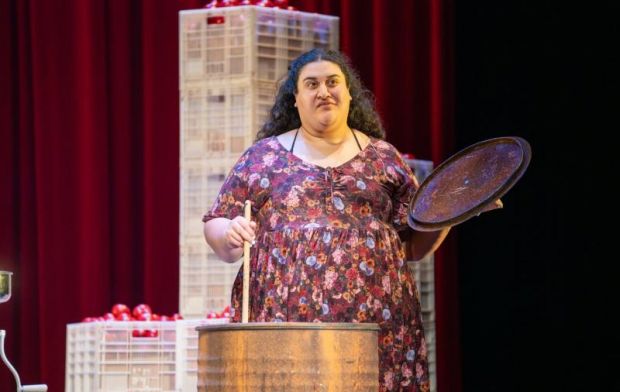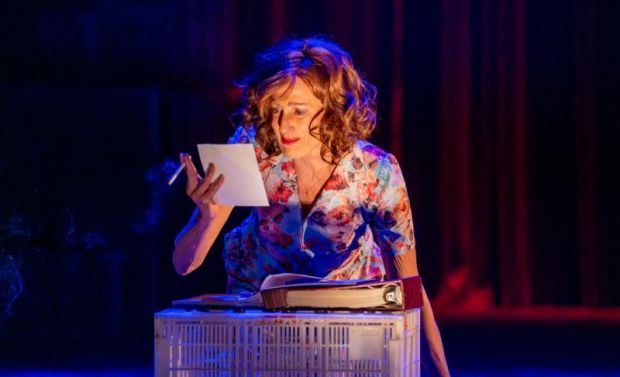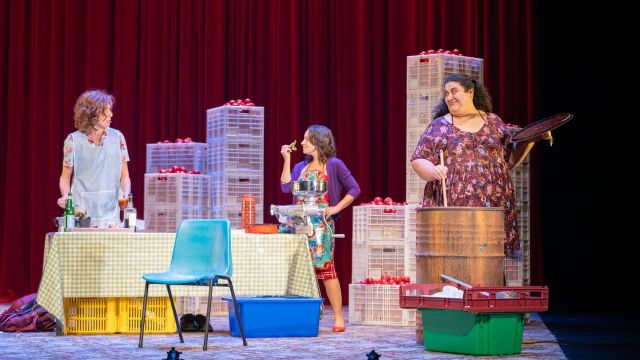Looking for Alibrandi
Vidya Rajan’s adaptation of Melina Marchetta’s iconic 1990s coming-of-age novel has done more laps around Australian theatres than a Year 12 student chasing their SACE-ATAR dreams. First unleashed at Melbourne’s Malthouse Theatre and later charmed the socks off Belvoir Street audiences in Sydney, this latest STSA production at the Dunstan Playhouse proves the show’s staying power is as potent as Nonna Katia’s homemade grappa. Please forgive the following continual reference to Italian-based food that is triggered by this production. The set is full of tomatoes, some real, some fake, the real ones being used for cooking on-stage filling the auditorium with a tantalising smell even before the play actually begins.
This isn’t just a faithful adaptation – it’s a slick, vibrant production that bursts with high production values, sharp direction, and outstanding ensemble. Every element – lighting, sound, design – sings in harmony. If theatre had a Michelin guide, this would be a solid three stars with bonus cannoli.

The title Looking for Alibrandi gives away the game: three generations of Italian-Australian women grappling with what they believe is a multi-generational curse (spoiler alert: it’s just inherited trauma with a side of spicy Catholic guilt). Josie Alibrandi, our sharp-tongued heroine, is sandwiched between her progressive single mum, Christina, and the walking monument to Old World drama that is Nonna Katia – who firmly believes all Alibrandi women are doomed. Cursed, she says. You know, the usual: teen pregnancy, abandonment, and one almighty family bust-up.
But like any good pasta bake, there’s more bubbling beneath the surface. A long-buried family secret threatens to explode like an overstuffed ravioli – and when it does, the result is a moving, emotional crescendo. The scene where the secret is finally revealed is exquisitely performed by Chanella Macri (Josie), Lucia Mastranone (Christina), and Jennifer Vulteic (Nonna Katia) – each one delivering emotional punches with the precision of a seasoned espresso slinger.

The cast is wonderfully nimble, slipping into multiple roles like theatre-trained shapeshifters. Special shout-out to Ashton Malcolm’s sensitive John Barton and Lucia Mastranone’s fiery Sera Russo – a friend so full of zest she should come bottled like limoncello.
And then there’s Chanella Macri. Casting her as Josie is a bold and brilliant move. A towering force on stage (both literally and metaphorically), Macri brings sardonic wit, deep emotional resonance, and a physical presence that obliterates cookie-cutter casting tropes. Whether she’s cracking wise or cracking open her soul, she commands the stage like she owns the postcode. The decision to repeatedly place her in vulnerable, exposed moments might raise eyebrows, but it also dares the audience to interrogate its own biases – around gender, race, body image – all while Macri effortlessly walks the line between comic bite and devastating pathos. She is magnificent.

But don’t let the emotional depth fool you – this play is also very funny. And not in a gentle chuckle kind of way. It’s packed with zingers sharp enough to slice salami. Riley Warner’s delivery of a line about San Pellegrino – “tastes like beer that gave up!” – had the opening night crowd roaring with laughter. Out of context, it sounds odd. In context, it’s comedy gold.
Stephen Nicolazzo makes an assured STSA debut, and if this production is anything to go by, he’d better clear his calendar – audiences will want more.
In short, Looking for Alibrandi is a whip-smart, heart-tugging, laugh-out-loud delight. Come for the nostalgia, stay for the powerhouse performances, and leave with a renewed appreciation for Italian-Australian angst, adolescent chaos, and the strangely political nature of mineral water.
Tony Knight
Photographer: Matt Byrne.
Subscribe to our E-Newsletter, buy our latest print edition or find a Performing Arts book at Book Nook.

